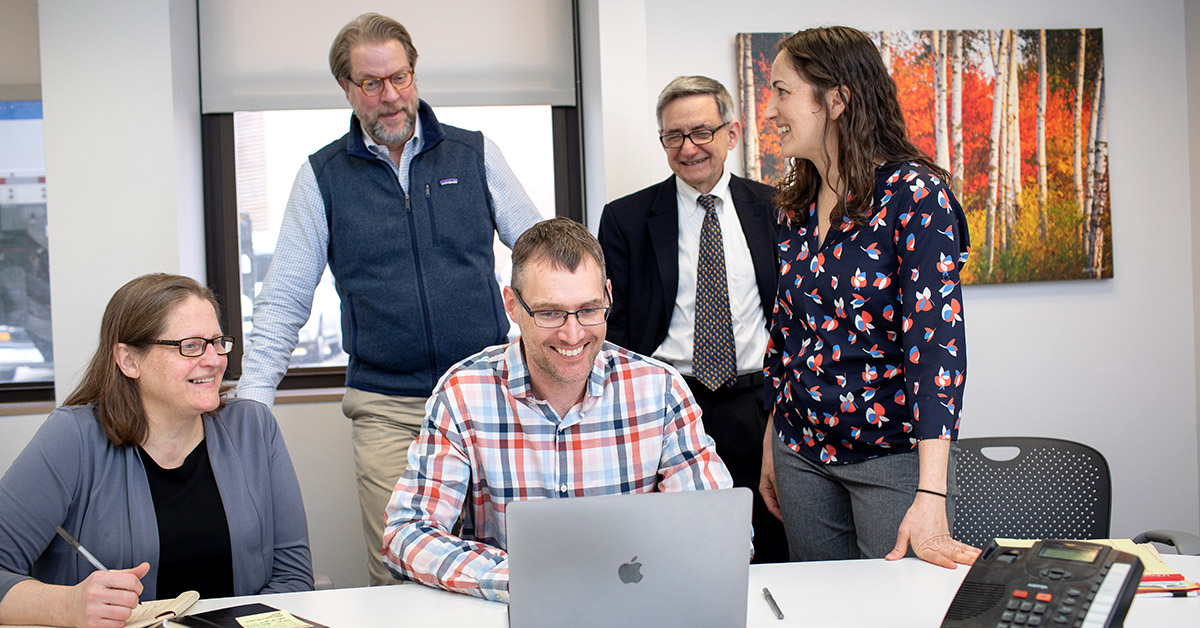A new collaboration among three of Minnesota’s most important health research, education, and care delivery organizations — University of Minnesota School of Public Health, Mayo Clinic, and Hennepin Healthcare — trains a cohort of scholars each year in a game-changing, modern approach to health care called learning health systems (LHS). The model embeds researchers in a health care system, creating a nimble feedback loop among researchers, clinicians, and patients so they can more quickly, and together, improve the quality of care.
Though the concept of learning health systems has existed for a decade, embedded researchers remain rare across the U.S., in part due to the limitations of traditional research training programs. This is where the Minnesota collaboration comes in. It developed and leads the Minnesota Learning Health System Mentored Career Development Program (MN-LHS), centered at the School of Public Health, and it teaches researchers how to systematically generate, apply, and translate evidence quickly while part of a health system.
“Busy practices can’t wait for five months to gear up to do a randomized, controlled trial,” says Timothy Beebe, MN-LHS co-director, School of Public Health professor, and head of the Health Policy and Management division. “They want and need information fast and without sacrificing scientific rigor. And when it comes to health systems management, rapid advances and shifts in health care policy, payment reform efforts, and health IT and data are forcing clinical practices to constantly adapt.”
It’s estimated that by 2020, medical knowledge will double every 73 days. The traditional research process is not flexible enough to meet this changing landscape and the needs of patients and health care systems — the typical “research to action” or “bench to bedside” timeline takes, on average, 17 years. MN-LHS flips that model by having researchers study in health care delivery settings. This level of proximity brings scientific evidence into practice much faster, creating better outcomes for everyone, especially patients, clinicians, and health systems.
Funded with a $4 million grant from the Agency for Healthcare Research and Quality (AHRQ) and the Patient-Centered Outcomes Research Institute (PCORI), MN-LHS will work on a cohort model, with two to five researcher scholars per year embedded in an active health care system for an intensive, mentored research experience. At the heart of their training is a weekly “DesignShop,” where scholars, mentors, and affiliated faculty from across the state gather with others to solve problems, role play stakeholder engagement scenarios, and get expert input.
Fairview Health Services, Minneapolis VA Health Care System, Children’s Minnesota, Ebenezer Senior Living, Essentia Health, and HealthPartners are integral collaborative clinical partners with MN-LHS, mentoring and training the scholars to make meaningful differences in health care contexts serving children, the elderly, underrepresented minorities, rural populations, veterans, and those with multiple health needs.

How a learning health systems approach reduced opioid prescriptions
At the Mayo Clinic, there were major variations in how opioids were prescribed for surgical procedures, even for patients with similar opioid use history undergoing the same procedures. But from 20016-2018, specialty specific multidisciplinary teams, using a learning health systems approach, developed prescribing guidelines for each surgical procedure. In orthopedic surgery, this resulted in a decrease of opioids prescribed by 50 percent, with no observed increase in refills. It’s estimated that this work could reduce the number of excess opioids in Minnesota communities by up to 1 million pills per year.
The model
The MN-LHS and its model of recruiting, training, and mentoring health services researchers embedded in health care systems is a prototype for increasing the effectiveness of health services research and replicable, with variations, across the U.S.
The impact
Collaborations similar to the Minnesota partnership could bring value to decision-making processes, conduct rigorous research responsive to the needs of clinical practices and patients, and rapidly translate research to improve clinical practice and outcomes. Results can include improved personalization, quality, equity, and outcomes of care, as well as reduced waste in the health care system.

